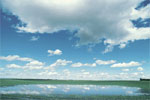 Teacher Guide
to the Westward Expansion
Teacher Guide
to the Westward Expansion
The Westward Expansion refers to the period in United States history when there was a focused effort to expand the country all the way to the Pacific Coast. After Thomas Jefferson completed the Louisiana Purchase in 1803, the United States grew by about one million square miles. This set the tone for many in the new country and they were enthusiastic to travel westward and to establish new territories. This period which established the country as we know it now was a period of many challenges and trials for the pioneers.
In many cases the Westward Expansion involved people starting out with all their worldly possessions in a wagon and setting out on barely established roads. The Oregon Trail and Santa Fe Trail were the two well-used paths for the westward movement. This difficult journey was mentally and physically challenging.
In today's context, with GPS and advanced weather reports, quality medical care and great roadways, it is hard to imagine the extent of bravery exhibited by these pioneers in setting out on a journey with little or no information. They were following a dream and setting out based on stories of fertile lands and great wealth. While they knew that it would not be an easy journey, very few could have completely anticipated the full extent of the journey's demands.
The pioneers were heading West often into lands owned and occupied by Native Americans. While there were many occasions were the two sides came to peaceful agreements, fairly often there were hostile interactions. The use of violence against the Native American tribes was seen as a legitimate way to grow the country and this meant that travelers often had to engage in battles. There was much loss of life on both sides.
This was travel in less than optimal conditions and so sanitation was a big issue. The lack of proper hygiene left many people vulnerable to diseases and there was no question of adequate medical help. This was another major challenge for those who were engaged in this Westward march and again lead to many deaths.
The roads and travel conditions were demanding. There were many accidents because of the poor conditions of the roadways and because the wagons could not always handle the wear and tear of the journey. This could be physically demanding because tired travelers had to work on fixing their transportation before they could continue with their journey.
Another unpredictable detail of the Westward trip was the extreme weather conditions. The families which had set out to travel and pitch tents and move from night to night had to face dramatic changes in weather along the way. Given their meager resources they literally had little or no protection against the heat and the cold; the rain and the wind. There were no comfortable hotels to stay in and often there was not even a town to settle near. There were even cases like the Donner party where the travelers lost their way completely and had to resort to cannibalism to last through harsh conditions. Those who made it past all these challenges had a tremendous feeling of accomplishment because it was definitely not a trip for those weak in body or spirit. The Westward Expansion is a testament to the spirit of the early American pioneers.